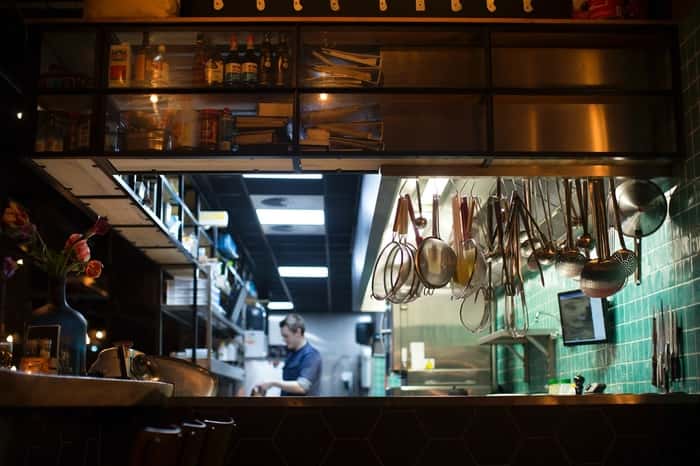
Food is an integral part of any restaurant, bar, and brewery. For a brewery or bar serving food, whether it’s through their own kitchen, a food truck, a pop-up, or another option, it keeps customers in the taproom longer, increases average check amounts, and adds to a better overall experience.
“If you do sell food as a brewery, you will also sell more beer,” says Tim McLaughlin, CEO and Founder of GoTab, a Restaurant Commerce Platform (RCP) used by large and mid-sized restaurants, breweries, bars, and hotels. “If you’re a brewery that does not sell food, you should find a truck or some other way to sell food.” According to McLaughlin, GoTab has worked with many breweries that have done studies and every single one finds they sell more beer when they sell food.
And while there are many considerations to designing a food menu kitchen, arguably the most important first step is to apply for a food service license.
A restaurant, bar, or brewery needs the necessary permits to legally serve food. We’re going to be blunt here: Getting a food service license can be a tedious process, but as a business owner it is crucial that you follow all the necessary steps.
Without the proper permits and licensing, you won’t be able to legally serve food and could potentially miss out on a crucial boost to your bottom line.
What We’ll Cover in This Piece:
What Is a Food Service License?

Photography courtesy of: Clem Onojeghuo | Unsplash
Any business that serves cooked food on-site needs a food service license. Whether you’re a restaurant owner or food truck operator—and food is your business—or bar or brewery operator and you’ve chosen to add food to your menu, you need a food service license.
Essentially, this specific permit means that your establishment has met all the necessary federal and local regulations to safely serve food to customers.
Local state health departments issue food service permits, so obtaining one means you’ve been approved by your local government to serve food.
For that reason, food service licenses vary by state. You absolutely need to check with your local health department to understand what the application process will look like.
3 Things to Consider When Applying for a Food Service License
While the process will differ by state, here are the steps you’ll need to take:
Do Your Research
Before even applying for a food service license, you need to understand the federal and local laws. Check the FDA’s website for food and drug processing laws along with your local health department for food handling laws relevant to your state and county.
For the most part, you can Google “food service license [insert state here]” to be directed to your local government page on food service licenses. But if you’re looking for an easy place to start, the FDA has a page called “State Retail and Food Service Codes and Regulations by State” that will direct you to the right place.

Photography courtesy of: Lasse Bergqvist | Unsplash
Fill Out and Submit the Application
As we mentioned, it’s important to remember that this process will differ by state. Generally, here is what you can expect:
- Find the Application – Most applications can be found online. Check your local state health department to find the appropriate food service license application.
- Fill Out the Application – When filling out the application, you’ll most likely need details about your establishment such as the name, address of the kitchen (this applies to food trucks as well), personal information, etc. Note: Typically, you will need to pay an application fee in addition to the fee for the actual food service license.
- Pay the Fee for the Food Service License – Depending on the location, number of seats, and size of the staff in your restaurant, the cost for a food service license can vary widely. Anywhere between $100 to $1,000 is not unusual. Once you pay the fee you’ll receive your proper licensing. Typically, food service licenses are effective for one year before they expire. You need to renew each year, but the renewal fee is often less expensive than the original payment.
Pass the Health Department Inspection
Every business that serves food will be required to pass inspections from your local health department.
The health inspector determines that your restaurant, bar, or brewery is up to code and can safely and sanitarily serve food to its customers. The inspector will check everything from the temperature of your walk-in coolers or refrigerators to the standards of your bathroom to the dates labeled on your products.
It’s important to note that you will typically be charged a fee for the health inspection (separate from the fee for a food service license).
Remember: You will need to pass the health inspection in order to legally obtain or keep your food service license. If you fail the inspection you risk losing your permit, or if you’re applying for the first time you’ll need to go through the whole inspection again and pass before you can receive your food service license.
You Have Your Food Service License… Now What?
Once you do have a food service license you’re ready to rock n’ roll with your food menu. One of the first things you’ll want to consider is the best way to display your menu to your customers.
Untappd for Business helps you create beer menus and publish them everywhere.
Whether your business needs a print, QR code, or digital menu, Untappd for Business makes it easy. By becoming a Verified Venue, you can share your current tap list or food menu with the world’s largest community of beer enthusiasts.
Other Content You May Enjoy
To succeed and grow your restaurant, bar, or brewery you need to stand out in local search results. Whether someone is searching for the “best craft beer near me” or “top-rated seafood restaurant in [your city],” Local SEO (Search Engine Optimization) helps your business appear at the top of those search results.
With 81% of consumers using Google Search and Maps to find local businesses, and nearly 90% of customers choosing a business on the first page of search results, optimizing your online presence is essential.
This guide will walk you through Local SEO strategies tailored for restaurants, bars, and breweries, covering Google My Business, website optimization, online reviews, local backlinks, and more.
By the end of this guide, you’ll have a step-by-step action plan to increase your search rankings, attract more local customers, and grow your business.
In today’s digital world, having a well-designed, functional website is essential for restaurants, bars, and breweries. It goes beyond having social media. A great website can help attract new customers, showcase menus, accept reservations, and even drive online sales. But one of the most common questions business owners ask is: How much should a website cost in 2025?
The answer depends on several factors, including the type of website, features, complexity, and whether you choose a DIY solution or hire a professional web developer. Costs can range from a few hundred dollars for a basic website to tens of thousands for a fully customized, feature-rich platform.
This guide will break down website costs for restaurants, bars, and breweries, helping you understand the pricing landscape and choose the best solution for your business
Trivia nights have become an incredible marketing strategy for bars, restaurants, and breweries to draw in crowds and engage with new customers. With the recent collaboration between Geeks Who Drink, Timeplay, and the iconic television show Jeopardy!, businesses now have an exciting opportunity to host the Jeopardy! Bar League. This partnership combines the global brand recognition of Jeopardy! with Timeplay’s cutting-edge technology and the fun of live trivia from the experts at Geeks Who Drink.
In this piece we’ll cover what this new collaboration between these two trivia powerhouses is and how you can bring this unique experience to your venue.
In today’s world, both websites and social media platforms are crucial for a brewery, bar, or restaurant’s online presence. However, consumer habits show distinct preferences for each, depending on the context of their search or interaction.
In this guide, we’ll go over the basics, walk you through how to leverage these tools effectively, and show you how understanding these trends can help your venue better meet your customers’ expectations.
As a restaurant, bar, brewery, or any venue with a food and beverage program, having a modern, functional, and aesthetically pleasing website isn’t just a luxury—it’s a necessity.
No matter the size of your business, your new potential customers often interact with your website first—and first impressions matter.
In this piece, we’ll explore the top website trends shaping the online presence of hospitality businesses in 2025. These trends will help your venue stand out and attract more customers while creating a unique and modern experience to establish the perfect guest experience from start to finish.
For bar owners, hospitality managers, and small business owners, selecting the right gin brands is more than just filling the shelves—it’s about curating a distinctive customer experience. Gin has soared in popularity, becoming a staple of modern cocktail culture. With its complex botanical infusions, gin offers versatile, memorable flavors that can attract a wide range of customers. But with so many choices available, which brands should you prioritize to bring out the best in your gin menu?
This guide explores the seven best gin brands that have proven themselves through quality, craftsmanship, and unique flavor profiles. By understanding what makes each brand special, you and your staff will be better equipped to create a standout gin selection that delights your patrons, reinforces your brand’s reputation with a robust gin drinks menu, and helps you continue crafting classic and innovative gin cocktails.

